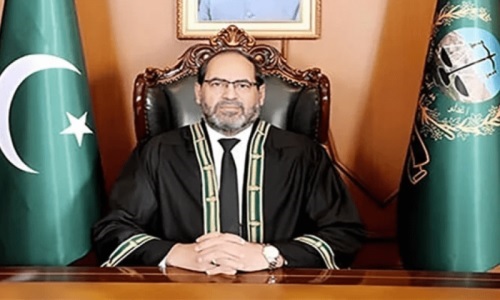- Citizens’ basic rights should not be abolished for holding court martial: Salman Akram Raja
Islamabad: Justice Naeem Akhtar Afghan of the Constitutional Bench of the Supreme Court said on Tuesday that international law is not clearly prohibited by the judicial martial of civilians.
The SC judge observed during the hearing of an intra -court appeals by a seven -member bench headed by Justice Aminuddin Khan against the announcement of the hearing of civilian cases in the military courts.
During the proceedings, Justice Jamal Khan Mandokil inquired about the implications whether a country had failed to comply with international rules and regulations. During the hearing, Justice Naeem Akhtar Afghan remarked that international principles do not state that citizens cannot be martial.
Salman Akram Raja, the lawyer of the accused, Arzam Junaid, on May 9, continued his arguments that he would complete his arguments by 11am. Justice Jamal Mandokal remarked that it would be better if the arguments were completed in half an hour.
Mr Raja replied that he should be allowed to say what he wanted so that he could end by 11am. He emphasized that in simple terms, the basic rights of ordinary citizens should not be abolished to martially.
The senior legal expert argued that judicial marshaling is against international standards for a fair trial.
“International standards require that the cases be public, fair and transparent, decisions should be made public. He said that military tribunals’ decisions around the world are often appealed to the courts, and a European court’s decision has made many. Countries have forced to revise their judicial martial procedure.
Justice Jamal Mandokil asked, “What if international principles are not followed?” To which Salman Akram Raja replied, “Not following international principles means that the case is not transparent.”
Justice Mandokel further pressured, “What if a country violates international principles?” Raja replied, “Some international principles are mandatory, while others are not. However, the principle of a fair trial included in Article 10A of our Constitution was included in the light of international standard.
After that, Justice Naeem Akhtar Afghan gave remarks, “International principles have not been said that citizens cannot be beaten by the court.”
Mr Raja pointed out that in the UK, he is organized by the court martial independent judges, not a military personnel. “In the case of FB Ali, the principle of separation of powers was not in its place. At that time, Deputy Commissioners and Tehsildars tried criminal cases. It was argued that if a deputy commissioner could prosecute a criminal case, the colonel could do the same.
Raja added, “All countries comply with international principles to the United Nations. The UN Human Rights Committee reviews these reports and gives their opinion. He added that October and November last year. Me, the UN Human Rights Committee reviewed Pakistan’s military justice system and expressed concern over the judicial martial of civilians.
He noted, “The committee found that Pakistan’s military courts were not free, and they recommended bail to those who came into military custody.” Raja also said that the European Commission has stated that the judicial martial of nine protesters was wrong, and that the European Union has given the status of Pakistan GSP Plus.
He highlighted, “Justice Yahya Afridi raised these concerns in his dissent, asking why thousands of ATC courts could be tried but 105 in question.”
During the hearing, an interesting exchange took place between Salman Raja and Justice Naeem Akhtar Afghan.
Mr Raja said, “In the UK, there was a case where a soldier named Fedley was martial. There was a weapon fire. The air – a TV was also broken there.
He continued, “During the May 9 incident, the person who broke the TV was the person I met later. He was deeply ashamed of what happened. He was an unemployed person. Which had only four levels of education and I could not help him – he was a victim of a society that gave people very little.
Justice Aminuddin Khan intervened and advised him to discuss personal issues, while Justice Jamal Khan Mandokil asked Salman Raja whether he had met the federation.
Justice Naeem Akhtar Afghan smiled and said, “No, Salman Raja has met the Pakistani Fedley.”
After that, Justice Hassan Azhar Rizvi commented, “You said that your client was playing first class cricket. He did not go to play cricket on May 9, did he?
Justice Muhammad Ali Mazhar asked, “Under what law was Klubhushan given the right to appeal? Is this law to us? To which additional Attorney General Aamir Rehman replied,” I will take this law on the record. “”
Justice Muhammad Ali Mazhar remarked, “Was this law introduced only for Klubhushan?”
Aziz Bhandari replied, “Spies who are allowed by the International Court of Justice deserve appeal.”
Then Justice Jamal Khan Mandokil asked, “How many clubs are there?”
Additional Attorney General Aamir Rehman replied, “FB Ali is also allowed.”
Subsequently, Salman Raja expressed disagreement with Justice Muneeb Akhtar’s decision in connection with the establishment of military courts, saying, “No judge should be allowed to add words to the constitution which is not part of the text of the Constitution. If this is allowed, it will be extremely dangerous.
Justice Jamal Khan Mandokhil replied, “Another example can be from Anarkali Bazaar, where it was written ‘Buddhism Quality’ (good quality y standards) outside a shop, but someone called it ‘Buddhism to Ultimate’. Read (the elders are inverted).
Salman Raja cited decisions of this practice and procedure and decisions of Article 63-A, emphasizing that no court in the world would be free unless it ensured the right to a fair hearing. He argued that even without Article 175 (3) of the Constitution, Section 2 (D) of the Army Act could be banned on the basis of Article 10-A.
Justice Muhammad Ali Mazhar remarked, “Justice Muneeb Akhtar considered the military courts a parallel judicial system in the majority decision.” Salman Ikram Raja replied, “Justice Muneeb Akhtar considered the history and explained the constitution. He wrote that the military courts have a historical background, and on the basis of history, translating the constitution has very dangerous consequences. This is a very dangerous way to translate the constitution.
He further argued, “When the constitution is clear, it cannot be interpreted itself, as was translated by Article 63-A, but in Article 63-A review, the interpretation was correct.”
At the same time, Salman Akram Raja ended his arguments, and the Supreme Court adjourned the hearing of the case of military courts till tomorrow. The founders of PTI’s lawyer, Azar Bhandari will begin their arguments tomorrow.










